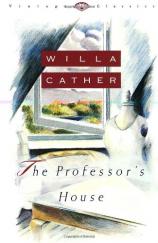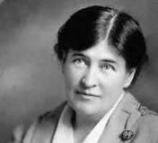Reading Group Guide
Discussion Questions
The Professor's House

1. This novel is named, not after its protagonist, but after his house. It is a house in which no one lives, that has been "dismantled" [3], and that, even when inhabited, was "almost as ugly as it is possible for a house to be." Why, then, is it so important to Professor St. Peter--and, indeed, appear to become more so in the course of the novel? How does Cather establish the house's character and use it to indicate the character of her protagonist? Compare her description of St. Peter's old house to her treatment of the family's new residence and other houses, like Louie Marsellus's "Outland" and the abandoned cliff-dwellings on the Blue Mesa.
2. Although St. Peter has pursued a life of the mind, Cather describes him in highly sensual terms: "for looks, the fewer clothes he had on, the better." [4] He luxuriates in the ornamental shrubs and flowers of his French garden, and in swimming. His keenest memories--of his youthful voyage along the coast of Spain and the dahlias he bought as a student in Paris--vibrate with sensuous detail. Why does such a sensual--and in some ways even hedonistic--man seem to disapprove of his family's pursuit of worldly pleasures and possessions? In what ways does St. Peter's hedonism--if such it is--differ from theirs?
3. Although the St. Peters initially seem happy, the reader gradually realizes that the family is torn by jealousy and resentment, and that its patriarch has effectively withdrawn from its affairs. At what points do these characters become aware of their emotional disconnection? Why are they unable--or unwilling--to overcome it?
4. One reason for the divisions in the St. Peter family is Tom Outland, who was Godfrey's pupil, his daughter's fiancŽ, and, ultimately, her benefactor. In what ways has Outland fragmented the family, both while alive and after his death, and why did the family let him do so? Why do nearly all the members of the household stake some kind of claim on him, as evidenced by Kathleen's remark to her father: "Our Tom is much nicer than theirs"? [113]
5. Why does St. Peter remain so strongly attached to Tom Outland almost a decade after the young man's death? Cather equates the boy with the Professor's discarded younger self: "He was a primitive. He was only interested in earth and woods and water. Wherever sun sunned and rain rained and snow snowed...places were alike to him. He was not nearly so cultivated as Tom's old cliff-dwellers must have been--and yet he was terribly wise." [241] What other reasons might there be for the Professor's devotion? To what kind of wisdom is Cather referring in the preceding passage? How did St. Peter lose it as he grew older and what did he acquire in its place? In what ways does Tom Outland's story recapitulate the older man's?
6. Alongside the spartan Outland, who refused to contaminate his friendships with any element of self-interest, Cather gives the professor a son-in-law, Louie Marsellus, who is unabashedly materialistic. In marrying Tom's one-time fiancŽe, Louie has also become the main beneficiary of his discoveries. But wealth alone may be insufficient: Louie seems intent on replacing Tom in the professor's affections, just as he jokes about having Tom's talismanic blanket made into a dressing-gown. Does Cather want the reader to dislike Louie, as his brother-in-law Scott McGregor does? In what way does Louie conform to period stereotypes of the social-climbing, luxury-loving nouveau riche? Why does the professor feel affection for him, even though Louie's values seem diametrically opposed to his?
7. Is St. Peter subconsciously attempting suicide when he falls asleep without turning off the gas stove in his old study? What significance do you find in the fact that he is saved by a woman? How clearly does Cather allow us to know the motives of any of her characters?
8. The Professor's House is a novel of oppositions--youth vs. age, instinct vs. contemplation, solitude vs. domesticity. Yet we should be careful not to read those oppositions too simplistically. Although St. Peter mourns the way he has sacrificed his truest self to the demands of society and family, Tom Outland is equally haunted by the way he betrayed his friendship with Roddy Blake, who had committed the crime of selling Indian relics to a German buyer: "Anyone who requites faith and friendship as I did, will have to pay for it." [229] Does Tom suffer from his inhuman idealism just as the professor suffers from his unthinking compromises? In what other ways does Cather introduce ambiguity into this novel's moral scheme? Does she suggest any way in which her opposing values might be reconciled?
9. Where does Cather draw analogies between St. Peter's betrayal of his ideals and events in the larger world? In what ways does the novel's milieu function as a macrocosm of its protagonist's psyche?
The Professor's House
- Publication Date: October 31, 1990
- Paperback: 272 pages
- Publisher: Vintage
- ISBN-10: 0679731806
- ISBN-13: 9780679731801








